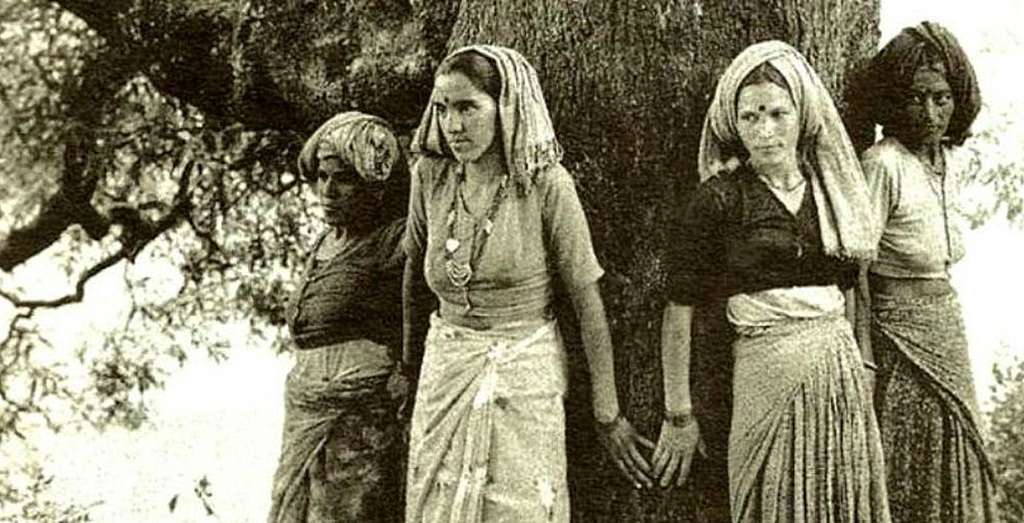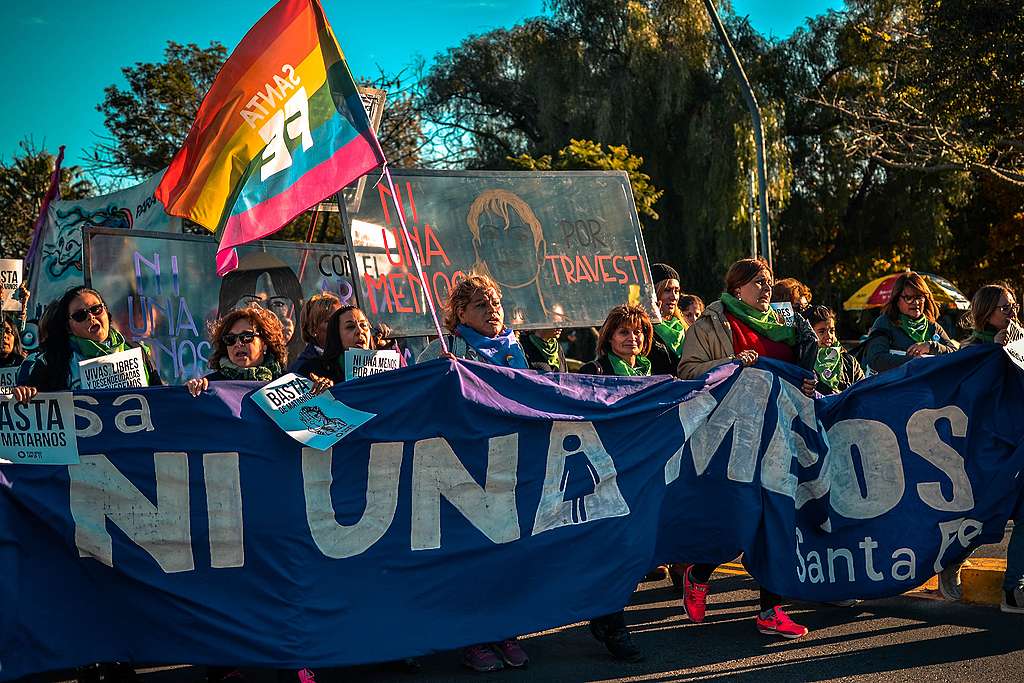Women have always been on the frontlines of resistance. Now more than ever, feminist movements are rising like the seas against all kinds of oppressions. Local as well as international movements, led by organised groups of women have changed laws, moved borders and transformed collective action across the globe.
Creating a transformative and compassionate society towards all life on earth requires us to start by acknowledging, again and again, that the destruction of human lives and the planet's resources carry the same violent roots, embedded in systems of oppression and exploitation upheld by colonial, capitalist, and patriarchal practices.
Communities in the Global South have a long and deep history of leading eco-feminist resistance movements. Here we highlight three of them: The Chipko Movement in India, Ni Una Menos in Argentina, and most recently, the feminist uprising in Iran sparked by the brutal murder of Jina (Mahsa[1]) Amini.
The Chipko Movement

© NA, CC BY-SA 4.0 via Wikimedia Commons
April 1973, Uttarakhand, North India
The first action of the Chipko Movement - a growing nonviolent forest conservation campaign - gathers the villagers of Mandal to prevent a nearby forest from logging by literally embracing the trees. The wood-rich area had become a hub of commercial interest and foreign logging companies after the China-India border conflict in 1963, and the mismanagement of these companies caused destructive landslides and floods. The women of the region in particular relied heavily on the forest for food and fuel, so when their livelihoods became increasingly endangered, they got organised. Inspired by Mahatma Gandhi's method of nonviolent resistance, they encouraged villagers to physically block deforestation plans.
The campaign was a success and soon hundreds of other decentralised communities in rural areas across the country applied the same method, usually led by women.
The Chipko Movement is considered to be one of the pioneer ecofeminist movements of the last century, with principles of nonviolent resistance, decentralised direct action and ecology at the centre.
Ni Una Menos

© TitiNicola, CC BY-SA 4.0 via Wikimedia Commons
June 2015, Argentina
Feminists organised the first march under the name 'Ni Una Menos', translating into "not one (woman) less", after Chiara Páez, a 14 year-old pregnant girl was brutally murdered by her boyfriend. The march gathered over 200,000 people in Buenos Aires to voice their anger, break the taboo around the high rate of femicides [2], and challenge the country's toxic macho culture.
Grassroots movements under the same name soon emerged in other Latin American countries as well as in Europe. The mobilisations continue to gather hundreds of thousands of people in the streets to stop patriarchal power relations. Ni Una Menos asserts an intersectional approach to their battle by highlighting that patriarchal violence is closely linked to sexual, racial, economical and colonial injustices, among others. Solidarity stands at the core of their resistance, with people of all genders coming together to demand an end to social injustices. The mass actions put feminist topics on the media and social agendas in Latin America, creating a new feminist wave commonly known as "La Marea Verde" [3].
Iran
September 2022, Iran
When Iran's morality police tortured and killed 22 year-old Jina Amini for not dressing in accordance with government standards, it triggered the country into major unauthorised protests. Iranian feminists have been fighting for (equal) rights for four decades, and Amini's death was the spark that turned people's outrage into mass action.
In the days and weeks after Amini's death, women-led uprisings in the form of mass protests took place across the country. What made this rebellion stand out from previous ones is that different sectors of civil society, from ethnic and religious groups, to economic classes and age groups, united to form a strong front. They focused on a shared set of demands based on democratic values, rather than on their differences. The regime responded by arresting, torturing and jailing thousands, and killing hundreds of nonviolent protesters.
The mass mobilisations and strikes also sparked international solidarity protests, with grassroots collectives, human rights organisations and concerned citizens urging for an end to the violent rule of the Islamic State on its peoples. This most recent wave of feminist uprisings highlights the power of a diverse united front. The Kurdish slogan 'Jin Jiyan Azadi" (Woman, Life, Freedom) is now a known transnational feminist hymn.
Local NVDAs, strikes, and mass protests are all tactics used by both feminist and climate justice movements all over the world. Let us put the notions of intersectionality, solidarity, and collaboration into practice by unlearning biases, listening to and learning from others, and really speaking up and showing up for each other. When the voices of the most affected communities are at the core of action, we can create collective and transformative change.
Heleni Smuha is a filmmaker and storytelling organiser with Roots at Greenpeace International.
Notes
1. Mahsa is the Persian name she was forced to take on officially because, due to a long history of discrimination against the Kurds as a minority ethnic community in the State of Iran, Kurdish names are banned. Ironically, her real name and the name her family and close friends called her, "Jina", means "life" in Kurdish.
2. From the Spanish "femicidios": the murder of people identifying as women by their (former) sentimental partner.
3. Spanish for "The Green Wave", making reference to the emblematic green scarves that pro-choice supporters wear as a symbol of support for the legalisation of abortion campaign.
Roots is a global Greenpeace initiative that works with local organisers, activists, and grassroots initiatives in the Global South to develop skills and foster a community of solidarity that nourishes strong and healthy movements.
Check out the Roots podcast Why We Organize, which features stories of climate and justice activists with an intersectional focus.






